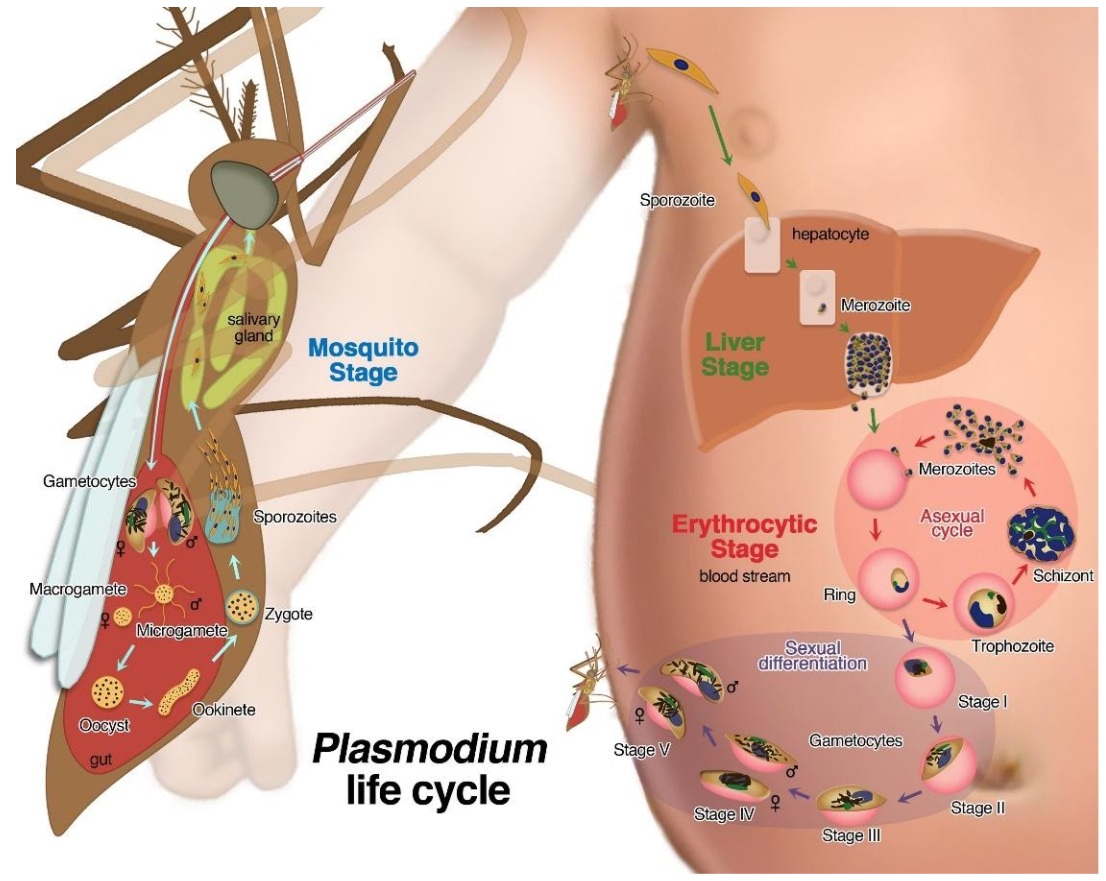
Mention the names of human body cells which are prone to the attack of Plasmodium.
Answer
573.9k+ views
Hint: Plasmodium is the unicellular parasite that causes the malaria in the vertebrates. It mainly lives in the host of the insects and the mammals. They live in the two hosts to complete its full lifecycle as the female Anopheles mosquito and the human.
Complete Answer:
When the female anopheles mosquito bites the infected person, the sporozoites enter the healthy person’s body. Plasmodium moves to the liver first and affects the liver cells. They produce the small vesicles and begin to undergo cell division and the reproduction. From there they move into the bloodstream affecting the red blood cells. These sporozoites grow into the RBC and start to multiply there.

After performing certain multiplication, these cells undergo bursting for every 48-72 hours. This bursting, may release several sporozoites in the blood. Each time when there is the bursting, there will be the symptoms of the high fever, chills and the sweating. The symptoms of the malaria in the human are alternate high temperature and the chill, vomiting, pain in the muscles, diarrhea etc.
Hence the plasmodium affects the liver and the erythrocytes in the human body and these organs are prone to this parasite.
Note: This female anopheles mosquito is called night bite mosquito, since they bite only during the time between the night and the dawn. Malaria also transfers to the other person by the blood transfusion and the sharing of the needles between the infected person and the healthy one.
Complete Answer:
When the female anopheles mosquito bites the infected person, the sporozoites enter the healthy person’s body. Plasmodium moves to the liver first and affects the liver cells. They produce the small vesicles and begin to undergo cell division and the reproduction. From there they move into the bloodstream affecting the red blood cells. These sporozoites grow into the RBC and start to multiply there.

After performing certain multiplication, these cells undergo bursting for every 48-72 hours. This bursting, may release several sporozoites in the blood. Each time when there is the bursting, there will be the symptoms of the high fever, chills and the sweating. The symptoms of the malaria in the human are alternate high temperature and the chill, vomiting, pain in the muscles, diarrhea etc.
Hence the plasmodium affects the liver and the erythrocytes in the human body and these organs are prone to this parasite.
Note: This female anopheles mosquito is called night bite mosquito, since they bite only during the time between the night and the dawn. Malaria also transfers to the other person by the blood transfusion and the sharing of the needles between the infected person and the healthy one.
Recently Updated Pages
Master Class 11 Computer Science: Engaging Questions & Answers for Success

Master Class 11 Business Studies: Engaging Questions & Answers for Success

Master Class 11 Economics: Engaging Questions & Answers for Success

Master Class 11 English: Engaging Questions & Answers for Success

Master Class 11 Maths: Engaging Questions & Answers for Success

Master Class 11 Biology: Engaging Questions & Answers for Success

Trending doubts
One Metric ton is equal to kg A 10000 B 1000 C 100 class 11 physics CBSE

There are 720 permutations of the digits 1 2 3 4 5 class 11 maths CBSE

Discuss the various forms of bacteria class 11 biology CBSE

Draw a diagram of a plant cell and label at least eight class 11 biology CBSE

State the laws of reflection of light

Explain zero factorial class 11 maths CBSE




